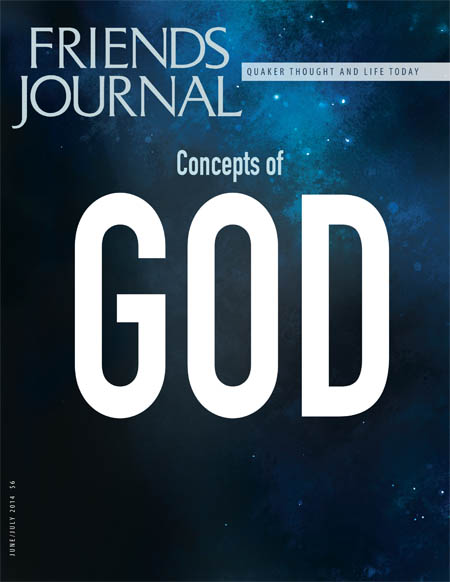
“Friends and God” are personal reflections from a selection of Friends on how they define God.
In my 20s, I was a spiritual dabbler. In my 30s, I wanted to reconnect with the authentic religious core of my childhood and the Jesus my parents loved and trusted. This Jesus was without the theological abstractions over which people have persecuted and killed each other for centuries.
In my 40s, I became a convinced Friend, having learned that I could speak my native religious language in my particular meeting with fellow worshipers who knew I was speaking the poetry of sacred story and not the axioms of orthodox doctrine.
In my 50s, I had come to understand that Quakerism is neither a theology nor a political philosophy, but rather a spiritual discipline. It is grounded in the Christian tradition yet doesn’t require Christian confession. It aspires to ever greater objectivity about the intersection of the spiritual and the material in human consciousness and action.
Now, in my 60s, I am sometimes troubled by the liberal Quaker tendency to equate an individual’s inner experience with what George Fox called “that of God” or “the Inner Light.”
For Fox, there is but one sacred whole. All individuals have the potential to test their habits of faith and practice against this reality and to be corrected and taught by it. Our inner experience involves the finite and fallible effort of human consciousness to pay attention to and understand this reality—colored by everything we have experienced or been taught outwardly by our families and cultures.
Fox wants us to discern the differences between our individual inner experiences and the unity of that one sacred whole.
Whether I am a Taoist or a Hindu or Shi’ite or secular humanist or a scientist, I can receive the “measure of the Light” I am ready to accept by opening myself to discernment of the gaps between what I think I believe and what is real.



Mike Austin Shell, you have expressed the true belief of a Universalist. A Global Consciousness, Force, or God exists for all of us, even atheists. No matter the religious training, each individual has an Inner (or Inward) Light to accept in a discernment between beliefs and reality.
Although personally raised with training through differing Christian Sects, since my Graduate College life, Universalism has been a religion for me. Partaking in the Quaker Universalist Voice gave me a base for becoming a member of the Quaker Universalist Fellowship. Faith in many different beliefs needs to be considered in our understanding of mankind.
With experience in teaching, as a professional student, Religious or Christian Education will probably be my next step in promoting Holistic or Quaker Education. By the way, I still have a couple years left to my fifties.
May God be with you.